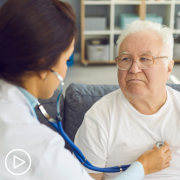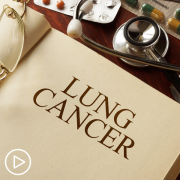Tag Archive for: lung cancer treatment decisions
What Could Advances in Lung Cancer Research and Treatment Mean for You?
What Could Advances in Lung Cancer Research and Treatment Mean for You? from Patient Empowerment Network on Vimeo.
Lung cancer expert Dr. Manish Patel discusses how lung cancer treatment approaches have evolved, specifically around targeted therapy and immunotherapy. Dr. Patel also provides advice for learning about and participating in clinical trials.
Dr. Manish Patel is a medical oncologist and Associate Professor of Medicine in the Division of Hematology, Oncology and Transplantation at the University of Minnesota. Learn more about Dr. Patel, here.
See More From Engage Lung Cancer
Related Resources:

|

|

|
Transcript:
Katherine Banwell:
When it comes to lung cancer research and emerging treatment options, what are you excited about, specifically?
Dr. Patel:
Well, I’m really excited about the fact that in 2021 chemotherapy is really no longer the backbone of treatment. It’s really now become where we are really focusing on whether immunotherapy is the main modality of treatment or if it’s a targeted therapy.
And while we do still have chemotherapy and we use it, it’s not the main focus of our treatment. So, that’s really exciting. I personally am extremely excited about all of the advances in immunotherapy and the new methods that are coming across in new clinical trials to improve upon immune responses in patients with lung cancer.
Katherine Banwell:
When do you think a clinical trial should be considered for lung cancer treatment?
Dr. Patel:
Well, I think that’s a great question. And I think, honestly, it could be considered at any point in the patient’s treatment plan. Now, just to expound on that a little bit further, I think in the setting where a patient should be cured of their lung cancer with the treatment that we propose, we have to be careful that we are putting in adequate safeguards that the trial that we propose ensures that they’re receiving standard of care treatment but maybe something additional to try to improve upon that treatment.
On the other hand, if a patient has a more advanced cancer, then there is little bit more leeway in terms of the things that we can try to do. But of course, we always want to make sure that whatever we offer them, we have a reasonable expectation of working as well or better than the standard of care.
Katherine Banwell:
How can patients stay up to date on research?
Dr. Patel:
I think there are a couple of very useful resources online to stay abreast of things. A particular website that I think is very useful for patients is something called YouAndLungCancer.com.
And that is a fairly expansive portal that is patient-focused and really provides a lot of video tutorials on lung cancer, different treatments at different stages, new treatments that are available. And that’s a site that gets updated fairly regularly in terms of standard of care. And so, as we are in a phase where lung cancer research is really advancing very quickly, and these updates are important that they’re, you know, sort of sharing all of the new things that are coming along in lung cancer.
Why Should You Ask About Lung Cancer Biomarker Testing?
Why Should You Ask About Lung Cancer Biomarker Testing? from Patient Empowerment Network on Vimeo.
Biomarker testing is a vital component of lung cancer care. Dr. Manish Patel, a lung cancer expert, shares important questions for patients to ask about this essential testing to help ensure optimal care.
Dr. Manish Patel is a medical oncologist and Associate Professor of Medicine in the Division of Hematology, Oncology and Transplantation at the University of Minnesota. Learn more about Dr. Patel, here.
See More From Engage Lung Cancer
Related Resources:

|

|

|
Transcript:
Katherine Banwell:
Why should lung cancer patients ask their doctor about biomarker testing?
Dr. Patel:
It’s extremely important. Biomarker testing is really the guiding principles by which we make a treatment plan for lung cancer patients in 2021.
We know that every patient’s lung cancer is a little bit different at the molecular level. So, they might look the same under the microscope, but, you know, if we get to a more deeper level, we can understand that they are quite different and they may respond differently to different treatments.
And so, it’s extremely important. And I think it’s important to know that nationwide we don’t always do a great job of doing real adequate biomarker testing. And so, from a patient perspective, it’s really useful to be an advocate for yourself and to ask your physician, you know, “Have we done biomarker testing, and to what extent have we done biomarker testing?” because it’s not uniform across the country at the moment.
Katherine Banwell:
Are there specific biomarkers that affect treatment choices?
Dr. Patel:
Absolutely there are. So, as an example, the molecular testing with DNA mutation analysis – so we actually look at the mutations that are present within a patient’s tumor, and that really does define a group of patients both in the curative setting and in the setting with more advanced disease that defines our treatment choices. Likewise, PD-L1 is a biomarker now that is being incorporated onto whether or not we use immunotherapy or whether we use immunotherapy with chemotherapy for patients that don’t have mutations.
So, it’s become an extremely important part of our treatment regimen.
Shared Decision-Making: Your Role in Lung Cancer Treatment Choices
Shared-Decision Making: Your Role in Lung Cancer Treatment Choices from Patient Empowerment Network on Vimeo.
Lung cancer treatment decisions involve various factors, but what role should the patient play when choosing therapy? Lung cancer expert Dr. Manish Patel explains the considerations involved, the concept of shared decision-making when making a treatment choice, and provides questions to ask about a proposed treatment plan.
Dr. Manish Patel is a medical oncologist and Associate Professor of Medicine in the Division of Hematology, Oncology and Transplantation at the University of Minnesota. Learn more about Dr. Patel, here.
See More From Engage Lung Cancer
Related Resources:

|

Why Should You Ask About Lung Cancer Biomarker Testing?
|

|
Transcript:
Katherine Banwell:
When making a treatment choice, what three key considerations are there for lung cancer patients?
Dr. Patel:
Well, I think always the first one that’s most important is really the patient in front of me, you know, what their physical function is, what their other medical problems that they might have. Number two is always going to be to consider the stage of the cancer, how advanced the cancer is. And then really with regards to lung cancer these days, we really have to consider what kind of lung cancer it is. And I don’t mean necessarily just differentiating between the kinda major subtypes of lung cancer, but really looking at more detailed understanding of the specific type of lung cancer because it does, sort of, guide our treatment.
Katherine Banwell:
The term “shared decision-making” is being used a lot lately when talking about patient care. What does that term mean to you?
Dr. Patel:
Well, I think what that means is as the oncologist – the treating oncologist – my role is to educate the patient on what the treatment options are, give my recommendations of what I think the best options are for that individual patient.
But really the shared decision-making ultimately means that we have a discussion about what the goals of the patient are and how those match up with what my recommendations are and then come up with a treatment plan that suits both mine and the patient’s needs.
Katherine Banwell:
I know some patients are hesitant to talk to their doctor about questions they may have about how they’re feeling.
Does that come into the shared decision process?
Dr. Patel:
I think it does in some ways. I mean, we do try to explore how much the patient is understanding from what we’re talking about, also make a lot of attempts to understand the concerns or hesitations that a patient might have about what we’re talking about, or perhaps if they are hesitant to talk about certain aspects of their health with us. But we do try to tease that out as much as we can in our patient encounters so we can make really the best decision for that patient.
Katherine Banwell:
Are there questions that patients should consider asking about their proposed treatment plan?
Dr. Patel:
Well, I think it’s always useful for patients to ask, “What can they expect?” You know, we talk a lot about potential side effects – what can happen with the treatments – and oftentimes we’re discussing them in sort of worst-case scenarios.
But I think in some ways it’s sometimes helpful for patients to know what do we expect to happen, why we are discussing the extreme cases – best- and worst-case scenarios – really having an idea of what they should expect from treatment.
Lung Cancer Treatment Decisions: What Should Be Considered?
Lung Cancer Treatment Decisions: What Should Be Considered? from Patient Empowerment Network on Vimeo.
What should be considered when making lung cancer treatment decisions? Dr. Isabel Preeshagul shares the factors that may affect treatment options, as well as how the patient can collaborate with their healthcare team for optimal care.
Dr. Isabel Preeshagul is a thoracic medical oncologist at Memorial Sloan Kettering Cancer Center. Learn more about Dr. Preeshagul here.
See More From Engage Lung Cancer
Related Resources:

|

|
Transcript:
Katherine Banwell:
Dr. Preeshagul, let’s start with you introducing yourself, please.
Dr. Preeshagul:
So, my name’s Isabel Preeshagul. I’m a thoracic medical oncologist at Memorial Sloan Kettering Cancer Center, which is a large academic cancer center in the Northeast. And I’m part of a group of 24 thoracic oncologists.
I specialize in treating patients with non-small cell lung cancer, small cell lung cancer, mesothelioma, and some other thoracic malignancies but most really just focused on lung cancer. I have a very strong research interest in predictive markers for response to immunotherapy as well as targeted therapy.
Katherine Banwell:
Excellent. Thank you so much. What are the considerations when choosing a treatment for lung cancer?
Dr. Preeshagul:
So, that is a very weighted question. And I could talk about that for forever. But to try to be as succinct as possible, the most important thing is to really look at who you’re treating in front of you and try to treat the patient as a whole. It’s not only their diagnosis and their histologic subtype and their stage that’s important.
You really need to think about what’s important to the patient. Is someone a concert pianist or a violinist and giving them a treatment that could potentially cause neuropathy, could that be life altering for them? Or, are they of child-bearing age? What are their priorities?
So, that’s really important to me. Social aspects of a patient’s life, religious aspects, beliefs, ethical beliefs, all of that you need to take into consideration. And then getting more granular, you need to know about the tumor biology.
Do they have any driver alterations? Do they have any other predictive markers that may help you plan your treatment? So, it’s a lot of different things that go into treatment planning.
Katherine Banwell:
Just remind us what neuropathy is.
Dr. Preeshagul:
Sure. So, neuropathy is when the nerves that are in, I guess you could say, your fingers and toes start to damaged.
This can happen from diabetes, from having glucose that is too high for too long, or it can happen from certain chemotherapy agents that can affect the fine nerves in your fingers and toes and cause them to go numb. And this can really be painful. It can be life-altering. It can keep you up at night. It can make your sensation decrease.
So, if you’re walking on the floor, you may not feel a fine, little nail, or you may not even really feel the floor. And if you’re really focused on using your hands for playing the piano or violin or sewing or even any other kind of activity, it can really affect how well you’re able to perform.
Katherine Banwell:
Yeah. What is the role of the patient in making treatment decisions?
Dr. Preeshagul:
So, I think every doctor will give you a different answer for this. But for my practice, I really make sure that the patient is part of the team as well as family members, as long as the patient gives permission. I run everything by the patient, of course. I give them all the possible options ranging from ones that I think would be most efficacious to ones that I think are other options and of course, the option of no treatment, which is always an option, and sometimes, the best options.
So, I really say these are the things that we can offer you, but what do you feel most comfortable with? What’s important to you? And sometimes, patients are taken aback by this question because some patients like to be told, “Well, this is what we’re going do, and this is when we’re starting,” and X, Y, and Z. That’s not how I practice.
And it’s really important to me that the decisions come from the patient but are guided by me and my team.
Katherine Banwell:
Why is it important for patients to feel like they have a voice in their treatment?
Dr. Preeshagul:
So, that is such a good question. And I think a lot of it comes from the fact that you have a patient that had a completely normal life and all of a sudden get delivered this life-altering news that they have cancer. And everything that they had control over just seems to completely go out the window just in a matter of seconds.
So, making sure that a patient is back in the saddle and has control again and feels like they know what the next steps and feels like they know what they can expect is really important to them from what I can see. And I think that is something that allows them to feel like they’re a little bit more like themselves again.
They come to meet me. They don’t know anything about lung cancer. Their world has been completely rocked. And when they know their treatment plan and they know their stage and they know what to expect and they’re kind of a little bit more on autopilot, I can see in some patients them being able to exhale a little bit and feel like they’re in control again, and they know what – every Monday, I’m going to come and see Dr. Preeshagul. I’m going to get my treatment. I might not feel so good the next couple days, but I know the week after and the week after that, I might feel a little bit better. And they kind of are back in control again.




